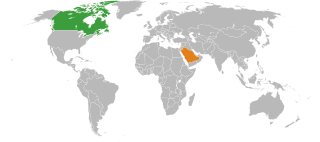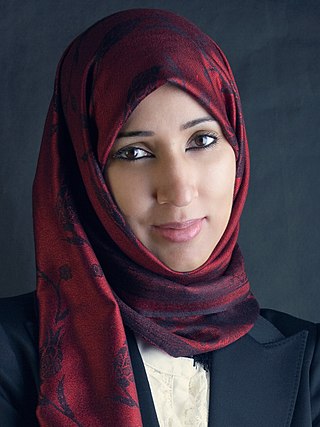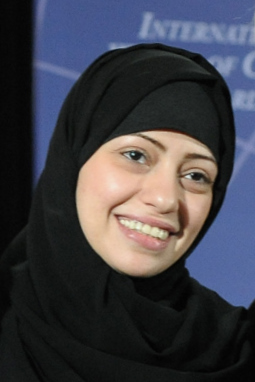
Human rights in Saudi Arabia are a topic of concern and controversy. Known for its executions of political protesters and opponents, the government of the Kingdom of Saudi Arabia has been accused of and denounced by various international organizations and governments for violating human rights within the country. An absolute monarchy under the House of Saud, the government is consistently ranked among the "worst of the worst" in Freedom House's annual survey of political and civil rights and was in 2023 ranked as the world's most authoritarian regime.

Canada and the Kingdom of Saudi Arabia have had a generally cordial relationship marred by periods of diplomatic tension. Both countries, however, share robust economic ties: Saudi Arabia is Canada's largest trading partner in the Middle East, and is also one of the largest recipients of Canadian military equipment. In February 2014, the Saudi government had purchased Canadian armaments worth CA$15 billion in total. Until August 2018, there were over 16,000 Saudi students enrolled in Canadian schools on government scholarships.
Multiple forms of media including books, newspapers, magazines, films, television, and content published on the Internet are censored in Saudi Arabia.
Women in Saudi Arabia experience widespread discrimination in Saudi politics, economy and society. They have benefited from some legal reforms since 2017, after facing fundamentalist Sahwa dominance for decades. According to Human Rights Watch and Amnesty International, Saudi women are still discriminated against in terms to marriage, family, and divorce despite the reforms, and the Saudi government continues to target and repress women's rights activists and movements. Prominent feminist campaigns include the Women to Drive Movement and the anti male-guardianship campaign, which have led to significant advances in women's rights.
Al-Ha'ir Prison, also known as al-Hayeral-Hayar or al-Haer, is a Saudi Arabian political, maximum-security, Mabahith-affiliated prison located approximately 25 miles south of Riyadh. It is the largest prison complex in Saudi Arabia and houses both men and women. It includes isolation cells, and physical torture rooms. Reportedly, a number of members of al-Qaeda are held there. There is also confirmation of unfavored royal family members being held there which include princess and princes, journalists, business rivals, political rivals, international prisoners or alleged dissidents or persons needing to be silenced, made an example of, and destroyed psychologically and physically. Many people have been held without charge, have no current, pending, or even past court dates, nor future release date. Past prisoners report being subjected to constant psychological, environmental, physical, social and sexual torture. Many noted persons are confirmed to be held there under these conditions and many other individuals suspected to be there, as the Saudi government limits communication for captives and refuses to provide information concerning certain detainees as a policy.
Wajeha al-Huwaider is a Saudi activist and writer, who played a key role in the anti male-guardianship and women to drive campaigns during the early twenty-first century. She is a co-founder of the Association for the Protection and Defense of Women's Rights in Saudi Arabia. As a result of her work, al-Huwaider has been the recipient of both significant legal prosecution in Saudi Arabia and international praise.

Manal al-Sharif is a Saudi women's rights activist who helped start a right-to-drive campaign in 2011. Wajeha al-Huwaider filmed al-Sharif driving a car as part of the campaign. The video was posted on YouTube and Facebook. Al-Sharif was detained on 21 May 2011, released, and rearrested the following day. On 30 May, al-Sharif was released on bail, on the conditions of returning for questioning if required, not driving, and not talking to the media. The New York Times and Associated Press associated the women's driving campaign as part of the Arab Spring and the long duration of al-Sharif's detention due to Saudi authorities' fear of protests.

Until June 2018, Saudi Arabia was the only country in the world in which women were forbidden from driving motor vehicles. The Women to Drive Movement was a campaign by Saudi women, whom the government denies many rights to which men are entitled, for the right to drive motor vehicles on public roads. Dozens of women drove in Riyadh in 1990 and were arrested and had their passports confiscated. In 2007, Wajeha al-Huwaider and other women petitioned King Abdullah for the right to drive, and a film of al-Huwaider driving on International Women's Day 2008 attracted international media attention.

The following is a timeline of the 2011–2012 Saudi Arabian protests from May to December 2011. The 2011–2012 Saudi Arabian protests are a series of ongoing protests taking place in Saudi Arabia, which began in January 2011, influenced by concurrent protests in the region.

Samar bint Muhammad Badawi is a Saudi Arabian human rights activist. She and her father filed court cases against each other in Saudi Arabia. Badawi's father accused her of disobedience under the Saudi Arabian male guardianship system and she charged her father with adhl—"making it hard or impossible for a person, especially a woman, to have what she wants, or what's rightfully hers; e.g, her right to marry" according to Islamic jurisprudence—for refusing to allow her to marry. After Badawi missed several trial dates relating to the charge, an arrest warrant was issued for her, and Badawi was imprisoned on 4 April 2010. In July 2010, Jeddah General Court ruled in Samar Badawi's favor, and she was released on 25 October 2010, and her guardianship was transferred to an uncle. There had been a local and international support campaign for her release. The Saudi NGO Human Rights First Society described Badawi's imprisonment as "outrageous illegal detention".

Basmah bint Saud bin Al Saud is a Saudi Arabian royal, businesswoman and human rights activist.

Raif bin Muhammad Badawi is a Saudi writer, dissident and activist, as well as the creator of the website Free Saudi Liberals.

Women played a variety of roles in the Arab Spring, but its impact on women and their rights is unclear. The Arab Spring was a series of demonstrations, protests, and civil wars against authoritarian regimes that started in Tunisia and spread to much of the Arab world. The leaders of Tunisia, Egypt, Libya, and Yemen were overthrown; Bahrain has experienced sustained civil disorder, and the protests in Syria have become a civil war. Other Arab countries experienced protests as well.
The modern history of Saudi Arabia begins with the declaration of the unification of Saudi Arabia in a single kingdom in 1932. This period of time in Saudi Arabia's history includes the discovery of oil in Saudi Arabia and many events. It goes on to encompass Saudi Arabia's brief involvement in World War II in 1945. Afterwards, it includes Saudi Arabia's involvement in the Western Bloc and the Cold War. It also includes Saudi Arabia's proxy conflict with Iran, the Arab Spring, and the ongoing Arab Winter.
The lifetime prevalence of domestic violence in Saudi Arabia is estimated to be between 20%-39% for women, depending on the region in which they live. A 2015 study found that 20% of women visiting primary care centers in Riyadh had experienced domestic violence in the past year.

Ensaf Haidar is a Saudi-Canadian human rights activist. Born in Jizan, Saudi Arabia, Haidar is the wife of Raif Badawi, a Saudi writer, dissident and activist who was sentenced to ten years in prison and 1000 lashes in 2014. She actively campaigns for his freedom. Haidar is the President of the Raif Badawi Foundation for Freedom, which actively campaigns for freedom of speech and human rights awareness in the Arab World. She ran as the Bloc Quebecois candidate in Sherbrooke for the 2021 Canadian federal election but was defeated.
The anti male-guardianship campaign is an ongoing campaign by Saudi women against the requirement under the law to obtain permission from their male guardian for activities such as getting a job, travelling internationally or getting married. Wajeha al-Huwaider deliberately tried to travel internationally without male guardianship permission in 2009 and encouraged other women to do likewise. Women activists wrote a letter to the Saudi Minister of Labor and brought media attention to the issue in 2011. A 14,000-signature petition was given to royal authorities by Aziza al-Yousef in 2016 following a Human Rights Watch report on male guardianship. A crackdown against the activists took place in mid-May 2018, with 13 arrests as of 22 May 2018. Several of the women remained in prison as of December 2018. Some of the women activists were tortured, some of them in the supervision of Saud al-Qahtani, a close advisor of Crown Prince Mohammad bin Salman.
Israa al-Ghomgham is a Saudi Arabian human rights advocate. She is especially known for her documentation of the 2017–18 Qatif unrest.
Nassima al-Sadah is a Shia human rights writer and activist from the "restive Shi'ite-majority" eastern province Qatif, Saudi Arabia. She has "campaigned for civil and political rights, women's rights and the rights of the Shi'a minority" in the eastern province Qatif, Saudi Arabia for many years. She ran as a candidate in the 2015 Saudi Arabian municipal elections but was disqualified. Sadah and another prominent activist, Samar Badawi, were arrested on July 30, 2018, by Saudi authorities in a broader "government crackdown" on "activists, clerics and journalists."
Feminism in Saudi Arabia dates back to the ancient, pre-Roman Nabataean Kingdom in which women were independent legal persons. Twenty-first century feminist movements in Saudi Arabia include the women to drive movement and the anti male-guardianship campaign. Madawi al-Rasheed argued in 2019 that the Saudi feminist movement was "the most organised and articulate civil society" in Saudi Arabia.









